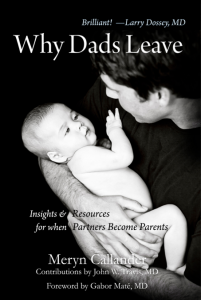 I must admit, I was a bit dubious upon setting out to read this book. As a man whose own father lived out of state as I was growing up, I wondered what this book could tell me that I didn’t already know. I didn’t know how wrong I was.
I must admit, I was a bit dubious upon setting out to read this book. As a man whose own father lived out of state as I was growing up, I wondered what this book could tell me that I didn’t already know. I didn’t know how wrong I was.The first few chapters were an eye-opening experience for me. Discussing the reverberations and psychology behind the Dynamic of Disappearing Dads (DDD), I found myself nodding as I related more and more to what was on the page. This book was a wonderful eye-opener for me on how I handle my issues. I discovered that even though I hadn’t left physically, I had left emotionally. Not only that, but this book also explained my feelings and reasoning for doing what I was doing, even though I couldn’t put them into words. It was as if someone had shone a flashlight into my brain and shouted “Eureka!”
This book also reinforced every parenting decision my wife and I made. It supported home birth, fewer interventions during the birthing process, skin-to-skin contact, breastfeeding, not allowing the child to “cry it out” alone and co-sleeping.
Some of my favorite parts of the book include the following:
“As a man feels himself to be incompetent, invisible, superfluous, he distances himself from home and from involvement with his child, and seeks redemption in the world of work and career – or at the bar or in bed with another woman.” Pg. 80
“Sometimes they (men) don’t want to listen because they believe they will be the target of criticism or negativity, they often think they have to defend themselves rather than support their partner in sharing their feelings.” Pg. 120
“Those who suffered terrible separations at an early age appeared indifferent to affection or hurt.” Pg. 194
Some things that I did not like about the book included the was the lack of mention of vaccines and their potential for developmental harm to young children (which, I feel is likely not necessary in the book, but if they were going to cover some of the other topics that were not really necessary, they might as well have covered everything) as well as the average father’s and mother’s approach to discipline. The author says on page 70 that on the average, mothers are more likely to shame or to hit their children. However, with as much emphasis on being a loving, engaged parent as this book is about, I found it to be quite lacking when it came to the subject of spanking or hitting. In fact, the only mention of physical “discipline” – if it can indeed be called that – was the brief citation above. Nowhere does the author cite statistics for the psychological trauma that ensues when the person you trust the most for your well-being as a little one lashes out, strikes you and hurts you – on purpose.
Another part I found to be lacking was the overall encompassing nature of this book. The author’s attempt, I believe, is for this book to be an “everything for everybody” kind of book. For example, there is a chapter on the father’s role during pregnancy. The chapter itself is full of good information, but for a father, like myself, who is not going to have more children, it wasn’t of much use to me. The book also gives advice, all good, on how to treat the new mother and how to be helpful just after the new baby comes home. Again, all well and good, but I didn’t glean much information out of this chapter, either.
In summation, I would give this book a solid “thumbs up”. I believe that the good information that it contains outweighs the portions that it leaves out. The good stuff is good – very good. The portions that were left out were simply disappointing. Also, the book contained almost too much information in its attempt to be a “one stop shop” for information. However, the insight into the male psyche, especially the new dad psyche can be invaluable in salvaging marriages, relationships, and most importantly, the relationship between a father and his child. That fact alone is worth the price of this book. Read it and learn from it. The information gleaned will not let you down.
More from author Meryn Callander can be found by clicking here.

